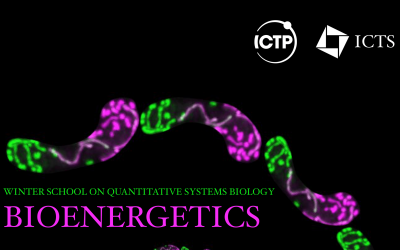Cells are the basic units of all living matter. They harness energy flows to drive biological functions. Most bio-chemical networks involved in energy transduction are nowadays well-characterized. However, the energetic costs and constraints for specific cellular processes remain largely unknown. In particular, what are the energy budgets of cells? What are the constraints and limits energy flows impose on cellular processes? Do cells operate near these limits, and, if so, how do energetic constraints impact cellular functions? Physics has provided poweerful tools to study nonequilibrium systems and to define these physical limits, but applying these tools to cell biology remains a challenge. Physical bioenergetics resides at the interface of nonequilibrium physics, energy metabolism, and cell biology. It seeks to understand how much energy cells use, how they partition this energy between different cellular processes, and the associated energetic constraints. In this School, we shall review the state of the art in physical bioenergetics with an aim to discuss and articulate open questions and future challenges.
This is the twelfth school in the series on Quantitative Systems Biology, held alternately at Trieste and Bangalore. The school responds to the strong need, especially at the Ph.D. and postdoc level, for providing scientists with a broad exposure to quantitative problems in the study of living systems. The audience will range from Ph.D. students to young faculty, who either work in this area or plan to do so.
The aim of QSB2023 will be to allow students from different backgrounds to become familiar with exciting developments at the interface of physics, bioenergetics, and cellular metabolism. Starting with an overview of cellular bioenergetics, biochemistry and metabolism, the students will be exposed to contemporary research areas covering a broad range of topics, including energetics of mechano-chemical processes, active matter and biological processes such as cellular growth, function and organismal development.
ORGANISING COMMITTEE
- Daniel Needleman (Harvard University, USA)
- Simone Pigolotti (OIST, Japan)
- Shashi Thutupalli (ICTS/NCBS, India)
SCIENTIFIC ADVISORY COMMITTEE
- Vijay Balasubramaniam (University of Pennsylvania, USA)
- Antonio Celani (ICTP Trieste, Italy)
- Sanjay Jain (University of Delhi, India)
- Vijay Krishnamurthy (ICTS, India, Local organiser)
- Matteo Marsili (ICTP Trieste, Italy)
- Mukund Thattai (NCBS, India)
SPEAKERS AND TOPICS
- Amitesh Anand
1) Redox centers and electron flow
2) Resource partitioning and energy metabolism
3) Bioenergetic plasticity and pathogenesis
4) Energetics as target space for nest generation antimicrobials
- Vaishnavi Ananthanarayanan
Mitochondrial dynamics and function
- Massimiliano Esposito
Title: Thermodynamics of Chemical Reaction Networks: From Basic Principles to Metabolism
1) Dynamics and thermodynamics
2) Using topology: fundamental forces and nonequilibrium potentials
3) Energy transduction, circuit theory, and metabolism
- Sunil Laxman
1) Cell metabolism as an economy - what control strategies do cells use, and how to identify what is at play
2) Ideas on Self-organization of metabolic networks, how it can lead to division of metabolic labor
3) Metabolic organization - challenges and rules in growth or survival programs
- Michael Lynch
1) Drift, mutation, and evolution
2) The bioenergetics costs of building and maintaining cells and cell parts
3) The origins of cell biology’s scaling laws
4) Principles of evolutionary overdesign and underperformance
- Jonathan Rodenfels (Developmental energetics, Measurement, Calorimetry)
1) Energetics of embryonic development
2) Basics and applications in developmental energetics/metabolism,
3) Energetic cost estimates
4) How to measure metabolic/energetic parameters (Heat, O2,CO2, Metabolomics and how they can be put together in a meaningful way for learn about mass and energy flows in developing systems.)
- Pablo Sartori (CRN, Thermodynamic laws in microbial communities)
1) Cellular growth as a non-equilibrium chemical process.
2) Biomass thermodynamics: entropy and enthalpy of biomass, what it is and how to estimate it.
3) Yield and dissipation across metabolic types.
4) Yield and dissipation within metabolic types
5) Practical: estiamting dissipation of different subcellular processes and of whole cell metabolism.
- Xingbo Yang (Measurement, Optical techniques/imaging, Active Matter, Flux control)
1) Active matter theory and cytoskeletal dynamics
2) Measurement of spatiotemporal cell metabolism (imaging)
3) Coarse-grained metabolic modeling and flux control
4) Spatial metabolism in mouse oocytes
Previous editions of this school
Eligibility criteria: Scientists and students from all over the world can apply for the School. Researchers from developing countries are particularly encouraged to apply. As the program will be conducted in English, participants should have an adequate working knowledge of this language. There is no registration fee.
Limited travel grants are available for participants from developing countries.
The school will not have an online component.
Accommodation will be provided for outstation participants at our on campus guest house.
ICTS is committed to building an environment that is inclusive, non-discriminatory and welcoming of diverse individuals. We especially encourage the participation of women and other under-represented groups.
 icts
icts res
res in
in

